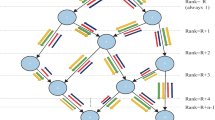Abstract
The Internet of Things (IoT) has brought a revolution in technology in the last decade. IoT is susceptible to numerous internal routing attacks because of the characteristics of the sensors used in IoT networks and the insecure nature of the Internet. The majority of the IoT ecosystem’s problems come during the routing phase. While routing, the attacking node causes a number of challenges with the packet transmission mechanism. Routing Protocol for Low-Power and Lossy Networks (RPL) is susceptible to numerous types of attacks. The effects could be disruptive to network performance and resource availability. In this paper, we investigate the impact of a novel attack known as the DIO suppression attack and propose a mitigation mechanism for this attack on RPL-based network. This attack disrupts the topology of a network, and as a result, certain number of nodes are disconnected. Attacker nodes exploit the trickle algorithm to execute this attack. The impact of DIO suppression attack in different topologies and scenarios is studied in this research. We have also proposed a lightweight mitigation technique to defend the networks from this attack. This technique leverages the trickling timer’s DIO Redundancy Constant k for each node to identify the attacking node in the network.
Access this chapter
Tax calculation will be finalised at checkout
Purchases are for personal use only
Similar content being viewed by others
References
Airehrour D, Gutierrez J, Ray SK (2016) Securing RPL routing protocol from blackhole attacks using a trust-based mechanism. In: 2016 26th International telecommunication networks and applications conference (ITNAC). IEEE, pp 115–120
Cao Y, Muqing W (2018) A novel RPL algorithm based on chaotic genetic algorithm. Sensors 18 (10):3647
Khan FI, Shon T, Lee T, Kim K (2013) Wormhole attack prevention mechanism for RPL based LLN network. In: 2013 Fifth international conference on ubiquitous and future networks (ICUFN). IEEE, pp 149–154
Levis P, Clausen TH, Gnawali O, Hui J, Ko J (2011) The trickle algorithm. RFC 6206
Miloslavskaya N, Tolstoy A (2019) Internet of Things: information security challenges and solutions. Clust Comput 22(1):103–119
Mitra D, Gupta S (2021) Data security in IoT using trust management technique. In: 2021 2nd International conference on computational methods in science & technology (ICCMST) (Los Alamitos, CA, USA, Dec 2021). IEEE Computer Society, pp 14–19
Perazzo P, Vallati C, Anastasi G, Dini G (2017) DIO suppression attack against routing in the internet of things. IEEE Commun Lett 21(11):2524–2527
Pongle P, Chavan G (2015) A survey: attacks on RPL and flowpan in IoT. In: 2015 International conference on pervasive computing (ICPC). IEEE, pp 1–6
Raoof AM (2021) Secure routing and forwarding in RPL-based internet of things: challenges and solutions. PhD thesis, Carleton University
Sedjelmaci H, Senouci SM, Taleb T (2017) An accurate security game for low-resource IoT devices. IEEE Trans Veh Technol 66(10):9381–9393
Tetcos. Tetcos: Netsim—network simulation software, India
Vasseur J (2014) Terms used in routing for low-power and lossy networks. RFC 7102
Wallgren L, Raza S, Voigt T (2013) Routing attacks and countermeasures in the RPL-based internet of things. Int J Distrib Sens Netw 9(8):794326
Weekly K, Pister K (2012) Evaluating sinkhole defense techniques in RPL networks. In: 2012 20th IEEE International conference on network protocols (ICNP). IEEE, pp 1–6
Winter T, Thubert P, Brandt A, Hui JW, Kelsey R, Levis P, Pister K, Struik R, Vasseur JP, Alexander RK et al (2012) RPL: IPv6 routing protocol for low-power and lossy networks. RFC 6550:1–157
Yavuz FY, Ünal D, Gül E (2018) Deep learning for detection of routing attacks in the internet of things. Int J Comput Intell Syst 12:39–58
Author information
Authors and Affiliations
Corresponding author
Editor information
Editors and Affiliations
Rights and permissions
Copyright information
© 2024 The Author(s), under exclusive license to Springer Nature Singapore Pte Ltd.
About this paper
Cite this paper
Kumar, R., Grover, J., Sharma, G., Verma, A. (2024). Addressing DIO Suppression Attack in RPL based IoT Networks. In: Patel, S.J., Chaudhary, N.K., Gohil, B.N., Iyengar, S.S. (eds) Information Security, Privacy and Digital Forensics. ICISPD 2022. Lecture Notes in Electrical Engineering, vol 1075. Springer, Singapore. https://doi.org/10.1007/978-981-99-5091-1_8
Download citation
DOI: https://doi.org/10.1007/978-981-99-5091-1_8
Published:
Publisher Name: Springer, Singapore
Print ISBN: 978-981-99-5090-4
Online ISBN: 978-981-99-5091-1
eBook Packages: Computer ScienceComputer Science (R0)




